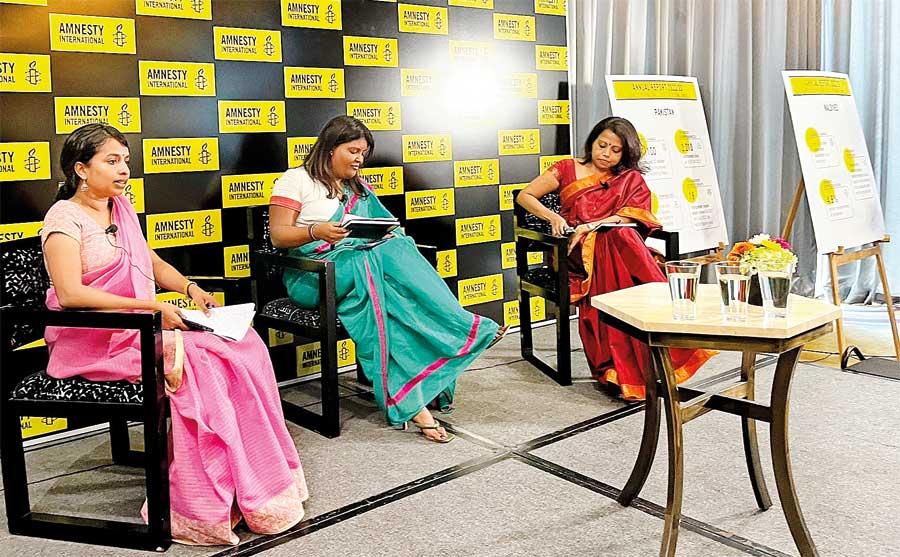29 Mar 2023 - {{hitsCtrl.values.hits}}
Amnesty International hosts panel discussion highlighting Sri Lanka’s year of protests

Swasthika Arulingam, Thyagi Ruwanpathirana and Ambika Satkunanathan (Amnesty International South Asia)
2022 was a year of reckoning of double standards, globally and in South Asia, Amnesty International said at the regional launch of its Annual Report on the state of human rights in the world.
world.
The report’s country profile for Sri Lanka highlighted key human rights concerns, including economic social and cultural rights, freedom of expression, association and assembly, arbitrary arrests and detentions, excessive use of force, impunity, right to truth justice and reparation as well as discrimination of minority groups.
“Memories of people standing in kilometre long queues waiting for hours, sometimes days at length, just to get access to fuel and gas are still fresh in our memories,” South Asia Researcher for Amnesty International Thyagi Ruwanpathirana, moderating a panel discussion on Sri Lanka’s protests said. “It’s now been close to a year since small pockets, groups of people started gathering in their neighbourhoods, protesting largely about the economic crisis. At Amnesty International we have tried our best to follow what’s going on and support the people’s right to peaceful protest to the best of our abilities,” she said.
The panel discussion featuring former Human Rights Commissioner Ambika Satkunanathan and Human Rights Lawyer and activist Swasthika Arulingam, reflected on Sri Lanka’s tryst with freedom of assembly and expression.
Talking about her experience within the Aragalaya as a protester, activist, lawyer and a young Tamil woman, panellist Swasthika Arulingam said that the involvement of youth was one of the key takeaways from the protest movement.
“One of the lasting impacts of the protest is that several young people, particularly from the middle class -- who have up till that point, maintained a distance with politics and activism -- engaged themselves and found hope that they could actually bring about change. Till that point you would hear a lot of young people saying, ‘what’s the point of politics?’ But I think the Galle Face Aragalaya changed that to some extent and in a sense, permanently politicized sections of the middle class. That is one reflection I had of the Aragalaya,” Arulingam said.
Another interesting feature of the protest movement she said was the people’s recognition of collective action to bring about change. “In the Rajapaksa regime, one of the things we saw is the beautification of Colombo, the gentrification, the removal of the urban poor from the vicinity of the more affluent classes of society. At the Aragalaya, people chose to occupy the Galle Face. People without political or economic power, chose to occupy one of the most prime properties in Colombo. We occupied it quite successfully for nearly six months. That also challenged the narrative. That was an interesting aspect,” she said.
“The Rajapaksas spent so much effort and energy pushing people from lower classes out of the vicinity of Colombo and then we found them at the Galle Face Aragalaya, chasing the same Rajapaksas out of power,” she recollected.
Arulingam believes that July 9, 2022 was a moment of pure sovereignty. “The executive presidential power was questioned on that day,” she said referring to the day protesters stormed then President Gotabaya Rajapaksa’s residence. “But one of the strengths and weaknesses of the Galle Face Aragalaya was that it didn’t have a leadership. It is the reason why July 9th happened but it is also its weakness that without leadership, you can’t take it beyond a certain point,” she opined.
What can the South learn from the North?
Asked about what the southern protesters can learn from the northern and eastern protesters, former Human Rights Commissioner Ambika Satkunanathan commented that a great amount of inspiration can be drawn from the tenacity of the North-Eastern protest movements.
“The families of the disappeared in the North and the East, those are the most visible protests. They somehow mobilized with much difficulty, (in spite of) the surveillance, intimidation and the harassment by security agencies. Southern media doesn’t really give them much visibility, even when they were attacked while on the way to see the President in February last year. Despite that they continued protesting. The tenacity of it, the singular purpose that they have, those are things that can be learned,” Satkunanathan opined.
Another important point to make is about allyship, the Human Rights activist said. “From the South, if people are going to support them, how do we support them? We don’t grab that space, we don’t talk on their behalf, and we don’t try to direct them. What we need to do is to listen to what they say. They will probably have complaints about how they’ve been let down. Having been part of the Human Rights Commission, believe me, I was under attack by everyone who kept telling me how the Commission had let them down. You just have to take it. But you also have to know that you can be and should be held accountable. That is very important,” she stressed.
The panellists also discussed the recent ‘Anti–Terrorism Bill’ gazetted on March 22, 2023, which seeks to abolish the controversial Prevention of Terrorism Act (PTA) and introduce an Anti-Terrorism Act (ATA).
“The PTA was used against the protesters at a time when the government itself had given a commitment to the international community that there would be a moratorium until they would repeal and replace it, with a law that’s acceptable by international standards,” Ruwanpathirana said urging the panellists to share their views.
The definition of the ATA itself, which is broad and vague, can be used against protests and activism, Satkunanathan opined. “You have the military being brought into perform law and order functions, to arrest people. You have the Deputy Inspector General of Police being given the power to issue detention orders, all of which can be used against civil society, activists and protesters,” she said.
“We have the President being given the power to declare certain places prohibited places -- it doesn’t say for how long this can be done. You have organizations which can be proscribed by the President. The process is not transparent, it can go on forever, and it is merely on the recommendation of the Inspector General of Police. So there are many aspects,” she explained.
The panellists also stressed that certain provisions can adversely impact protests, dissent, journalists and civil society. “People who have been affected by the PTA, have been asking for the repeal of the PTA. If you speak to the victims, none of them say, ‘we want to repeal the PTA and bring another counter terror law,’ Arulingam added. “The government is not listening for obvious reasons. But what is the role of international actors? What are you telling the government?” she questioned.
28 Apr 2024 7 hours ago
28 Apr 2024 7 hours ago
28 Apr 2024 8 hours ago
28 Apr 2024 8 hours ago
28 Apr 2024 28 Apr 2024